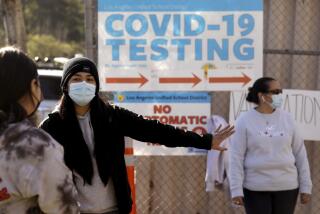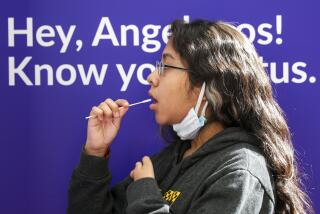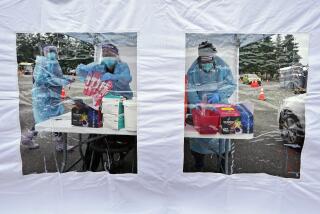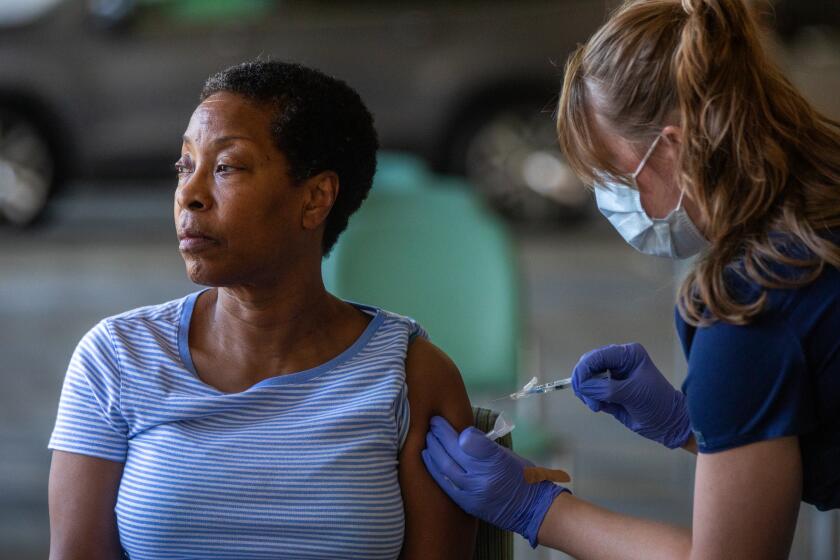Chaos at hospitals due to shortage of coronavirus testing
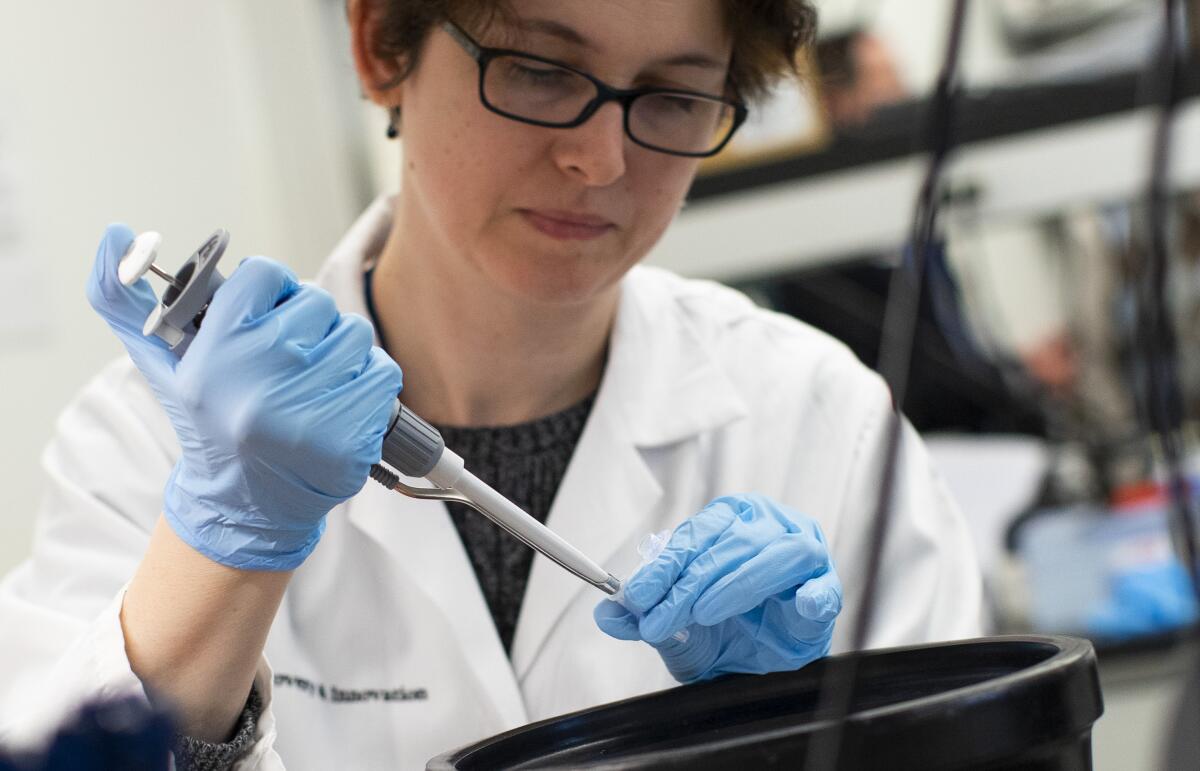
As COVID-19 cases spike, the testing needed to help stem the spread of the disease remains below what is needed to address the growing crisis, with healthcare workers across the state reporting widespread failings in the response by local and federal government officials.
Federal officials said nearly 1 million tests were expected to be available by the end of this week. But in California, one of the country’s hardest-hit regions with 60 cases, the total testing capacity is limited to only 7,400 through the weekend, according to the California Department of Public Health.
The inability to test widely and swiftly for the novel coronavirus has impeded the country’s ability to beat back the spread of the virus, experts say. Without testing, public health officials don’t know where the virus is spreading and where to target efforts to contain it. Twelve Americans have been killed so far by the disease.
The shortage of test kits as well as lab staffing to screen for the virus are creating chaos for doctors and nurses as their triage efforts are complicated by testing restrictions and shortfalls.
“Last night I had a patient with clear coronavirus symptoms, but the health department didn’t think he should be tested,” said an emergency room doctor in Downey who spoke on condition of anonymity. “I went from that patient into the next room, where I had an 80-year-old, immune-compromised, diabetic patient. If I’m taking coronavirus in there, it’s mild for me, but it’s deadly for her.”
Though the Centers for Disease Control and Prevention on Wednesday lifted some guidelines so anyone with symptoms can be tested by their physician, L.A. officials did not immediately adopt that criteria because of a backlog at the local health lab and continued to limit tests to hospitalized patients. Lab staff were working at least 18-hour days to keep up, county officials said.
On Friday, L.A. County officials, in a reversal, said they would adopt the CDC guidelines. Now doctors can recommend testing for anyone with symptoms.
Officials also announced that two commercial labs will be online by Monday to test for the virus.
“We don’t have capacity to test hundreds and hundreds and hundreds of people every day” at the county-run lab alone, said L.A. County Public Health Department Director Barbara Ferrer. “Now it’s up to the individual provider to make that determination.”
California has only tested 516 people for COVID-19 to date, far below what is probably needed in a state where Gov. Gavin Newsom declared a state of emergency this week due to the outbreak. Though there are only about nine known instances of community spread of the virus in California, the number of people who have been exposed to it appears to be growing daily.
About 1,250 Californians who were possibly exposed to COVID-19 on a cruise ship need to be tested for the virus. There are more than 9,000 people in California who have recently returned from countries experiencing severe outbreaks. Then there are others who may have been exposed within the community, and are now worried about infecting their families.
Renee Schwartz, a 60-year-old North Hills resident, said she was told by her doctors that her sinus infection and breathing problems could probably be COVID-19. But staff at multiple Los Angeles-area hospitals this week told her they don’t test for the virus.
“I said ‘Who does testing? And they said, ‘No idea,’” Schwartz said.
Ferrer estimated that 50 people in the county have been tested for the novel coronavirus. The low numbers have been due to limited testing capacity at the lab, not a shortage of test kits, she said. Workers in the lab had been working at least 18-hour days, she said.
On Thursday night, LabCorp, a commercial lab, came online, Ferrer said, and on Monday, Quest Diagnostics is expected to begin offering testing as well.
“This is all good news,” she said. “The limitation of our lab was not the lab kits, but we’re only one lab and we could only process a certain number of tests in one day.”
On Friday morning, Health and Human Services Secretary Alex Azar told reporters that the agency had provided all tests to the state of California “that they’ve asked for.”
A spokeswoman from the California Health and Human Services Agency appeared to agree with Azar, saying in an email to The Times that California “has continually requested more testing capacity from the federal government, and the CDC has continued to fulfill those requests on an ongoing basis.”
“As this need expands, we continue to ask for more tests — including just today,” she added.
The CDC has shipped enough test supplies to evaluate up to 75,000 people in public health laboratories nationwide, according to Azar, who said he expected up to 4 million tests would be available next week. “Everything is on schedule for the testing,” he added.
Integrated DNA Technologies, a private company working with HHS, also said Friday that it had produced enough supply to enable testing for more than 700,000 patients, but a spokeswoman said she did not have further information regarding when or where those supplies were delivered.
In a letter sent to medical staff at one Downey hospital and viewed by The Times, an infection control coordinator instructed doctors to discharge patients with mild coronavirus symptoms, asking them to self-isolate at home. In the long run, that tactic will make the total number of coronavirus cases virtually unknowable — at least until retrospective testing is available.
“Myself and my colleagues have been working in the trenches in the ER, and we can’t get people tested,” said another doctor who works at a hospital in Downey. Both declined to be identified because they are not authorized to speak to the media.
The doctor said another suspected coronavirus patient was a transplant nurse, whose job is to work with immune-deficient patients. “I said, ‘Come on! Please! We need to test her!’”
Amid the testing shortfalls, some healthcare workers also cast doubt on federal officials’ stringent approach to testing. One California nurse who was exposed to a confirmed coronavirus patient has symptoms and is in quarantine, but has not yet been tested for the virus by the CDC.
“They said they would not test me because, if I were wearing the recommended protective equipment, then I wouldn’t have the coronavirus. What kind of science-based answer is that?” the nurse, who asked to remain anonymous, said in a statement read by the National Nurses United’s union president Deborah Burger in a news conference in Oakland on Thursday.
“I’m a registered nurse and I need to know if I’m positive before going back to care for patients,” the nurse added. “Delaying this test puts the whole community at risk.”
Nationwide, 1,526 patients had been tested at the CDC as of Wednesday, which does not include the testing done at local and state labs, said agency spokesman Richard Quartarone.
In a call with reporters on Tuesday, Dr. Nancy Messonnier evaded a question about whether the narrow testing criteria early in the outbreak was linked to the limited availability in tests and potentially hindered the nation’s response to the outbreak. She also would not name the cause of flaws in the early test kits, saying the investigation is ongoing.
“What we really need to focus on is where we are today,” she said. “We need to be focused on what we’re doing today to identify patients who are ill, make sure that they’re getting appropriately treated and tested and make sure that we’re protecting our communities.”
It is unclear if those steps are being taken quickly enough as local health departments strain to keep up as the outbreak swells.
In Los Angeles County, a 32-year-old woman has been self-quarantining for two days after her doctor told her he suspected her high fever and pneumonia were caused by the novel virus. She has been waiting to hear from the public health department for next steps.
“I haven’t been contacted, I haven’t been tested,” she said. “I’m not being treated and I’m still exposing people by staying here at home. I live with family — they have jobs, they have schools.”
“I’m sick with something obviously,” she said.

